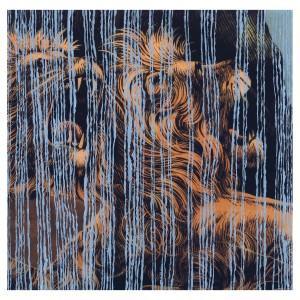Wholesome is not a word you should usually use to describe (unless you’re trying to be offensive) the sound quality of the instruments on an indie rock album. Most indie and pop music is rooted in a rock and blues tradition based partially on ideas of discomfort and immediacy, in stark opposition to choir music and most chamber music before the 20th century. But Julian Lynch’s Lines – an indie rock album in its own right – is wholesome, and warm, and sounds fit for a chamber performance. This is not because the songs, in and of themselves, are particularly antithetical to contemporary pop traditions, but instead because these songs are presented as being part of the fabric of a chamber music tradition, and they embody that traditions attitudes. The aim on lines seems to have been to create a living environment out of sound, rather than to perpetuate the sort of sonic extension – that thrash into the void – championed by guitar rock. 
Opener “Going,” which is ushered in by surprisingly bellicose woodwind stammers, is based around a rollick of post-colonial tom beats and a chattery, wide-mixed acoustic guitar. The song – and much of Lines – is given its modern context by the occasional recurrence of synthesizers and Lynch’s church hall vocals, which are just about the only thing putting him in stride with his Underwater Peoples label mates. A jarring fade on “Going” transforms it into a John Lurie-esque calyptic swimming song before the whole track disappears for good. “Going,” along with “Horse Chestnut,” sets the instrumental precedent for this album: high, tight digital age riffs played on woodwinds, accompanied by hypnotic, taiko-like percussion and basslines that just scream “essential.”
Lynch uses the orchestration at his disposal to a degree not often felt on modern albums; not only does he let woodwind and brass take center stage, he gives them dynamic melodies that sound tailor made to their instrument type, rather than have them copy a riff written on a guitar or piano. Unfortunately this does create some fractures on Lines, namely between the instrument on which these songs were clearly written (acoustic guitar) and the instruments that are providing the melodic raison d’etre for each song. Rather than an album of songs, Lines may sometimes play out like an album of tones. But this isn’t necessarily a bad thing: Lines is a tonal masterpiece.
“Cairos Kelleyi II” is perhaps the most alien track on the album, and is based around a chord progression that gives you the impression of being unplayable on a western scale. On the penultimate track “Onions” Lynch takes a strange turn towards the post-psych guitar noodling of a band like Unknown Mortal Orchestra, and even though “Onions” is not as good a song as anything on UMO’s debut, it provides a fleeting glimpse of what that band might sound like with absolutely astounding production. Even this rough, pseudo-jazzy guitar rocker has turns as something ancient, earthen, and foresty – like something that could come pouring from the glowing window of a solitary room in the middle of a cold Minnesota wood. I can’t imagine anyone, no matter how milquetoast their musical inclinations, who would not find Lines at least somewhat pleasant; I for one am a huge proponent of artists who put as much care into tonal presentation as they do songwriting, and I believe that Lines sets a strong precedent for DIY production that is unlikely to be matched anytime soon.

4.5/5 bars
